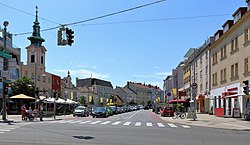Schwechat (German pronunciation: [ˈʃvɛçaːt] ) is a city southeast of Vienna known for the Vienna International Airport and Schwechater beer. The city is home to the refineries of the Austrian national oil company OMV.
Schwechat | |
|---|---|
 The central square in 2019 | |
| Coordinates: 48°08′28″N 16°28′43″E / 48.14111°N 16.47861°E | |
| Country | Austria |
| State | Lower Austria |
| District | Bruck an der Leitha |
| Government | |
| • Mayor | Karin Baier[1] (SPÖ) |
| Area | |
| • Total | 44.73 km2 (17.27 sq mi) |
| Elevation | 162 m (531 ft) |
| Population (2018-01-01)[3] | |
| • Total | 18,026 |
| • Density | 400/km2 (1,000/sq mi) |
| Time zone | UTC+1 (CET) |
| • Summer (DST) | UTC+2 (CEST) |
| Postal code | 2320 |
| Area code | 01 |
| Vehicle registration | SW |
| Website | www.schwechat.gv.at |
Geography
editSchwechat is named after the river Schwechat, which flows through the centre of town. The city subdivisions, called Katastralgemeinde (Cadastre), are Kledering, Mannswörth, Rannersdorf and Schwechat.
Population
edit| Year | Pop. | ±% |
|---|---|---|
| 1869 | 7,458 | — |
| 1880 | 8,910 | +19.5% |
| 1890 | 10,327 | +15.9% |
| 1900 | 13,636 | +32.0% |
| 1910 | 14,625 | +7.3% |
| 1923 | 14,372 | −1.7% |
| 1934 | 14,936 | +3.9% |
| 1939 | 14,813 | −0.8% |
| 1951 | 13,270 | −10.4% |
| 1961 | 13,403 | +1.0% |
| 1971 | 15,303 | +14.2% |
| 1981 | 14,834 | −3.1% |
| 1991 | 14,669 | −1.1% |
| 2001 | 15,286 | +4.2% |
| 2011 | 16,329 | +6.8% |
History
editHome to the settlement Ala Nova of the Roman Empire, the city was first mentioned in a document in 1334.[citation needed] The meeting at Schwechat of Emperor Leopold I with Jan Sobieski in 1683, after the liberation of Vienna, is commemorated by an obelisk. The imperial troops defeated the Hungarian insurgents in a battle fought here in October 1848.[4]
In 1724, a textile factory was established in Schwechat. Schwechat profited massively from the Austrian industrialisation wave of the 19th century, many of the companies established then still exist (i.e. the Dreher Brewery, founded in 1796 by Franz Anton Dreher the Younger). Schwechat became a city in 1924 and was incorporated into Vienna in 1938. The city's oil refinery was a bombing target of the Allied Oil Campaign of World War II, with the southern aviation plant complex of the Heinkel firm (Germany-based at Rostock-Schmarl as Heinkel-Nord, the Schwechat offices/facility was called Heinkel-Süd) also targeted in late 1943 and lasting through the spring of 1944.
Schwechat became an independent city in 1954. Since 2017 it belongs to Bruck an der Leitha District because Wien-Umgebung was dissolved at the end of 2016.[5][6]
Economy
editVienna International Airport and the headquarters of Austrian Airlines are in the city of Schwechat.[7][8]
When Lauda Air was an independent airline, it had its corporate headquarters in Schwechat.[9] Niki was also based in Schwechat.[10]
Education
editSchools include:[11]
Primary schools:
- Volksschule I & II
- Volksschule Mannswörth
- Volksschule Rannersdorf
Secondary:
- Allgemeine Sonderschule Schwechat
- Bundesgymnasium & Bundesrealgymnasium Schwechat
- Neue Mittelschule Schwechat Frauenfeld
- Neue Sport- & Sprach-Mittelschule Schwechat - Schmidgasse
Notable people
edit- Joseph Leopold Eybler (1765–1846), composer and Kapellmeister
- Ernst Ritter von Hartung (1808–1879), an Austrian General of the Artillery (Austria) and military theorist.
- Anton Dreher (senior) (1810–1863), brewer, inventor of Schwechater Lagerbier
- Anton Träg (1819–1860), an Austrian cellist and composer.
- Anton Schrödl (1820-1906), an Austrian painter of animals and genre scenes.
- Rudolf Hausleithner, (DE Wiki) (1840–1918), painter
- Ernst Seidler von Feuchtenegg (1862–1931), jurist, Minister-President of Cisleithania 1917/18
- Poldi Gersa (1874 – after 1902), an Austrian soprano and stage actress.
- Leopold Weinhofer, (DE Wiki) (1879–1947), politician (SDAP) and Mayor
- Alfred Horn, (DE Wiki) (1898–1959), politician (SPÖ), Mayor and freeman of Schwechat
- Max Stotz (1912–1943), military pilot
- Karl Trabitsch, (DE Wiki) (1929–2003), politician (ÖVP) and merchant
- Viktor Klima (born 1947), politician (SPÖ) and Chancellor of Austria, 1997-2000
Sport
edit- Rudolf Viertl (1902—1981), footballer, played 16 games for Austria
- Rudolf Vytlačil (1912—1977), a Czechoslovak football player and manager.
- Walter Skocik (born 1940), former footballer and football manager, played 314 games and 14 for Austria.
- Christopher Dibon (born 1990), footballer, played over 270 games
In popular culture
editSchwechat (as Megacity Schwechat) plays an important role in the Austrian sci-fi movie Die Gstettensaga: The Rise of Echsenfriedl.
References
edit- ^ Neue Burgermeister für Gänserndorf und Schwechat, NÖ ORF, March 10, 2015
- ^ "Dauersiedlungsraum der Gemeinden Politischen Bezirke und Bundesländer - Gebietsstand 1.1.2018". Statistics Austria. Retrieved 10 March 2019.
- ^ "Einwohnerzahl 1.1.2018 nach Gemeinden mit Status, Gebietsstand 1.1.2018". Statistics Austria. Retrieved 9 March 2019.
- ^ One or more of the preceding sentences incorporates text from a publication now in the public domain: Chisholm, Hugh, ed. (1911). "Schwechat". Encyclopædia Britannica. Vol. 24 (11th ed.). Cambridge University Press. p. 391.
- ^ "Bezirk Wien Umgebung wird aufgelöst". 10 September 2015.
- ^ "Wien-Umgebung: Aufteilung geändert", artikel in Niederösterreichische Nachrichten (NÖN.at), 24-9-2015
- ^ "Offices in Austria". Austrian Airlines. Archived from the original on 9 October 2010. Retrieved 26 May 2009.
- ^ "Information about the city plan." City of Schwechat. Retrieved on 5 September 2009.
- ^ "World Airline Directory". Flight International. 27 March – 2 April 1991. Retrieved 3 February 2013.
- ^ "About Us Contact". Niki. Archived from the original on 16 October 2009. Retrieved 2 September 2009.
- ^ "Schule Archived 2017-11-29 at the Wayback Machine." Schwechat. Retrieved on September 4, 2017.
External links
edit- Website of Schwechat (in German)


